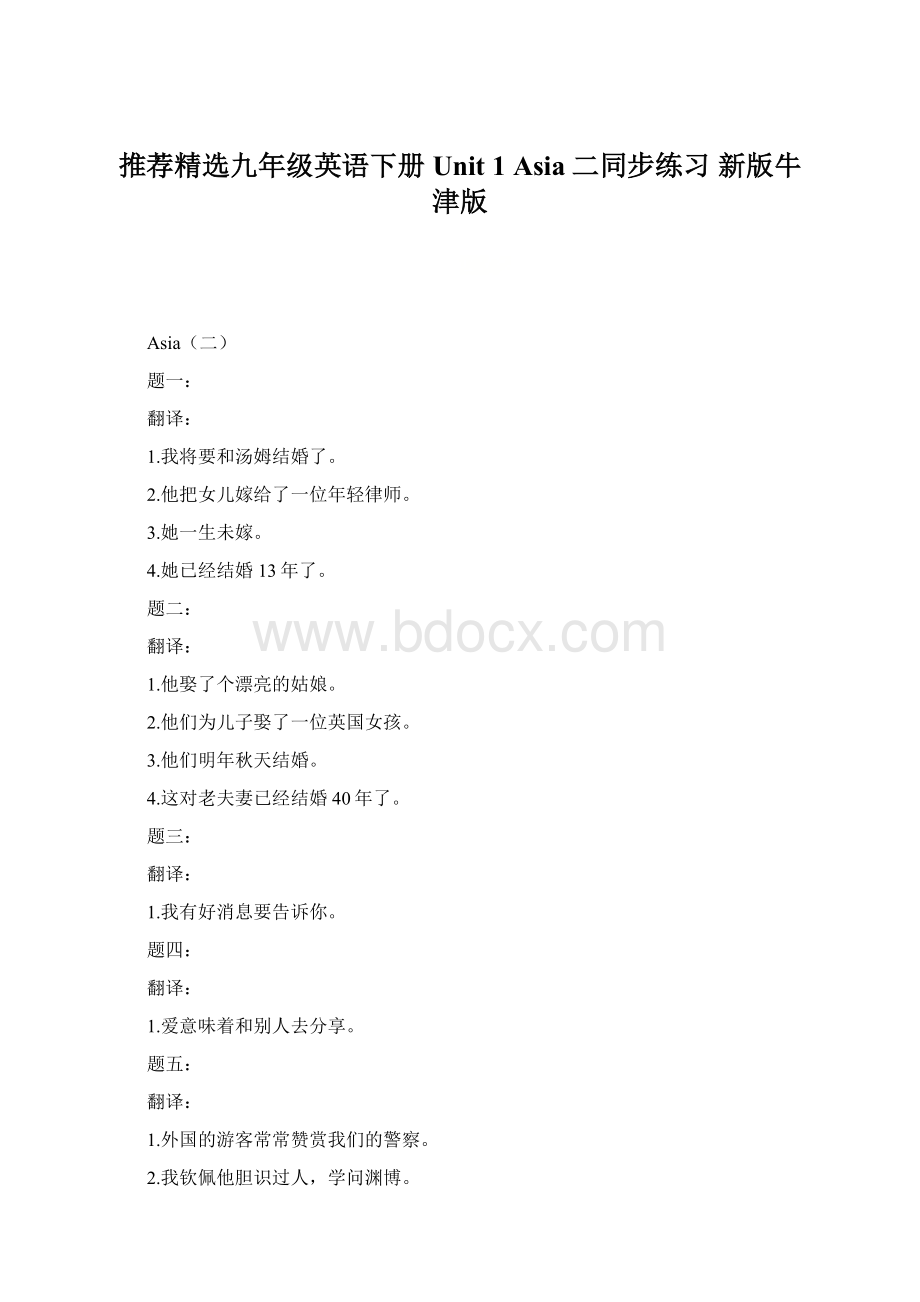推荐精选九年级英语下册 Unit 1 Asia二同步练习 新版牛津版.docx
《推荐精选九年级英语下册 Unit 1 Asia二同步练习 新版牛津版.docx》由会员分享,可在线阅读,更多相关《推荐精选九年级英语下册 Unit 1 Asia二同步练习 新版牛津版.docx(13页珍藏版)》请在冰豆网上搜索。

推荐精选九年级英语下册Unit1Asia二同步练习新版牛津版
Asia
(二)
题一:
翻译:
1.我将要和汤姆结婚了。
2.他把女儿嫁给了一位年轻律师。
3.她一生未嫁。
4.她已经结婚13年了。
题二:
翻译:
1.他娶了个漂亮的姑娘。
2.他们为儿子娶了一位英国女孩。
3.他们明年秋天结婚。
4.这对老夫妻已经结婚40年了。
题三:
翻译:
1.我有好消息要告诉你。
题四:
翻译:
1.爱意味着和别人去分享。
题五:
翻译:
1.外国的游客常常赞赏我们的警察。
2.我钦佩他胆识过人,学问渊博。
题六:
翻译:
1.我们钦佩他的勇气。
2.我们敬佩他们取得的巨大成就。
题七:
翻译:
1.他丢了这么多东西,真是太粗心了。
2.你在那么短的时间内到达那是不可能的。
题八:
翻译:
1.你太聪明了,能解出这道数学题。
2.你必须向他人学习。
题九:
翻译:
1.棉花在这个地区广泛种植。
2.这条宽阔大河就是黄河。
题一十:
翻译:
1.现在普遍用煤气烧饭和取暖。
2.玻璃桌子太宽,我们无法把它抬过门道。
题一十一:
翻译:
1.他英语说得很好。
2.李明每天晚上看电视。
3.他是一名学生。
4.我哥哥在一家工厂工作。
5.他经常帮助别人。
6.我父母每星期给我妹妹十元钱。
7.张先生50岁了。
8.一周有7天。
9.如果明天天气好,我们将进行足球比赛。
题一十二:
翻译:
1.约翰来自加拿大。
2.他们经常骑自行车去学校。
3.她很聪明。
4.我有一个红色的铅笔。
5.我每天六点起床。
6.迈克经常和他妹妹去公园。
7.杯子里有一些水。
8.太阳东升西落。
9.当我完成作业的时候,我给你讲故事。
题一十三:
翻译:
1.学生们正在画画。
2听!
有人正在听音乐。
3.他们在上英语课。
4.你总是把重要的事情忘掉。
5.我要走了。
题一十四:
翻译:
1.她在听电话。
2.看,李先生正在骑自行车。
3.他正在读书。
4.他总是玩电脑游戏。
5.叔叔下周要来看我。
题一十五:
翻译:
1.今天上午我见到了林涛。
2.去年她在美国。
3.他昨天买了一辆自行车。
4.双胞胎去年住在大连。
5.上周末她去看她的阿姨。
6.他上个月经常在学校吃午饭。
7. 我要是有再多一点钱,我就买汽车了。
8.昨天下午3点我在读小说。
9.那时孩子们正在睡觉。
10.她敲门时我正在做饭。
题一十六:
翻译:
1.昨天早上我在教室里。
2.昨天下午天气不热。
3.他们去年去上海旅行。
4.三小时之前我打扫的教室。
5.上周末,我的车被偷了。
6.露西在学校写家庭作业。
7.要是我知道她的电话号码,我就可以给她打电话了。
8.我们昨天下午5点正在放风筝。
9.当我们离开车站的时候,正在下雨。
10.昨天晚上七点到九点的时候我们在看电视。
题一十七:
PeterJuddwantedverymuchtobeasoldierwhenhewasachild.Sohejoinedthearmywhenhewaseighteen,andforseveralmonthshewastaughthowtobeagoodsoldier.Hedidquitewellineverythingexceptshooting.Onedayheandhisfriendswerepracticingtheirshooting,andallofthemweredoingquitewellexceptPeter.Afterhehadshotatthetarget(靶子)ninetimesandhadn’thititonce,theofficerwhowastryingtoteachtheyoungsoldierstoshootsaid, “Youarequitehopeless,Peter!
Don’twasteyourlastbullet(子弹)!
Gobehindthatwallandshootyourselfwithit!
”
Peterfeltashamed(羞愧的).Hewentbehindthewallandafewsecondslater,theofficerandtheotheryoungsoldiersheardthesoundofashot.
“Oh,dear!
”theofficersaid.“Hasthatsillymanreallyshothimself?
”
Heranbehindthewallasquicklyashecould,butPeterwasallright.“I’msorry,sir,”hesaid,“butImissedagain.”
1.PeterJuddjoinedthearmyinorderto________.
A.beasoldierB.begoodatshootingC.makefriendsD.getagoodjob
2.TheofficerthoughtPeterwashopelessbecause________.
A.hedidn’tknowhowtouseagun
B.hedidn’tgetalongwellwithothersoldiers
C.hewaspooratshooting
D.hecouldn’tdoanythingwell
3.Whattheofficersaidattheendofthefirstparagraphshowsthat________.
A.theofficerreallywantedPetertodie
B.theofficerwasveryangryw
ithPeter
C.theofficerwasnotakind-heartedman
D.theofficerwasafraidthatPeterwouldshoothimself
4.Theofficerfelt________whenheheardthesoundof
ashot.
A.ashamedB.frightenedC.ex
citedD.disappointed
5.Whathappenedattheendofthestory?
A.Peterbecameagoodsoldier.
B.Peterkilledhimselfbehindthewall.
C.TheofficerwaspleasedwithPeterintheend.
D.Petermissedthetargetforthetenthtime.
题一十八:
Mr.Leewasinbedandwastryingtogotosleepwhenheheardthebellring.Heturnedonthelightandlookedathisclock.Itwastwelveo’clock.“Whocanitbeatthistimeofnight?
”Hethought.Hedecidedtogoandfindout.Sohegotofbed,putonhisdressinggown(浴袍)andwenttothedoor.Whenheopenedthedoor,therewasnobodythere.“Thatisverystrange.”Thenhewentbacktohisbedroom,tookoffhisdressinggown,gotbackintobed,turnedoffthelightandtriedtogotosleep.
Afewminuteslaterheheardthebellagain.Mr.Leejumpedoutofbedveryquicklyandrushedtothedoor.Heopenedit,butagainhefoundnoonethere.Heclosedthedoorandtriednottofeelangry.Thenhesawapieceofpaperonthefloor.Hepickeditup.Thereweresomewordsonit:
“Itisnowaftermidnight(午夜),soitisAprilFool’sDay(愚人节).Aprilfooltoyou!
”
“Oh,itwastheEnglishboynextdoor!
”Mr.Leeexclaimed(惊叫)andalmostsmiled.Hewentbacktobedandfellasleepatonce.Thebelldidnotringagain.
1.WhendidMr.Leegotob
ed?
Hewenttobed_______.
A.beforetwelveo’clock B.aftertwelveo’clock
C.whenthebellrang D.whenhesawtheboy
2.Whydidherushtothedoorwhenheheardthebellringthesecondtime?
A.Hewantedtoopenthedoorforthevisitor
B.Hewantedtofindoutwhothevisitorwas.
C.Hewasafraidofthering
D.Hewaswaitingforsomeone.
3.Fromthispassage,welearnthatwecan_______onAprilFool’sDay.
A.say“Hello”toeachother B.danceandsingatnight
C.playjokesoneachother D.sendpresentstochildren
4.WhatdidMr.LeethinkabouttheEnglishboy?
Hethoughthe_________.
A.wasagoodboy B.wasfriendlywithhim
C.shouldn’tringthebellatmidnight D.didadangerousthingjustnow
Asia
(二)
题一:
1.I am going to marry Tom.
2.Hehasmarriedhisdaughtertoayounglawyer.
3.She never married in life.
4.Shehas been married for 13 years.
解析:
1.marrysb.“嫁给某人,与……结婚”,相当于get/bemarriedto。
2.marrysb.tosb.“让某人与某人结婚”,一般指父母把女儿嫁给某人或为儿子娶媳妇。
3.marry作不及物动词时,常与副词early,late,well,happily,never,again等连用。
4.marry是非延续性动词,因此不能和表示一段时间的状语连用,表示结婚已有一段时间应用have/hasbeenmarried。
题二:
1.He gotmarried toa pretty girl.
2.TheymarriedtheirsontoanEnglishgirl.
3.The
yaregoingto marry inthefallofnextyear.
4.Theoldcouplehavebeenmarriedforfortyyears.
解析:
1.marrysb.“嫁给某人,与……结婚”,相当于get/bemarriedto。
2.marrysb.tosb.“让某人与某人结婚”,一般指父母把女儿嫁给某人或为儿子娶媳妇。
3.marry作不及物动词时,常与副词early,late,well,happily,never,again等连用。
4.marry是非延续性动词,因此不能和表示一段时间的状语连用,表示结婚已有一段时间应用have/hasbeenmarried。
题三:
Iwanttosharegoodnewswithyou.
解析:
share…with…“与……分享……”。
题四:
Lovemeansto sharewith others.
解析:
sharewith…“与某人分享某物”。
题五:
1.Foreignvisitorsusually admire ourpolicemen.
2.I admire himforhisbraveryandlearning.
解析:
1.admire“钦佩,赞赏”及物动词,后接名词或代词作宾语。
2.admiresb.for(doing)sth.“因……钦佩/赞赏某人”。
题六:
1.We admire hiscourage.
2.We admire themfortheirgreatsuccesses.
解析:
1.admire“钦佩,赞赏”及物动词,后接名词或代词作宾语。
2.admiresb.for(doing)sth.“因……钦佩/赞赏某人”。
题七:
1.Itiscarelessofhimtolosesomanythings.
2.It is impossible for you to get there in such a short time.
解析:
1.It’s+adj.+ofsb.todosth.“某人做某事……”,此时形容词是用来描述人的性格、品质的词,如careful,kind,friendly等等。
2.It’s+adj.+forsb.todosth.“做某事对于某人来说……”,此时形容词用来描述不定式所表达的事物特征的词,如important,easy,hard等等。
题八:
1.It’scleverofyoutoworkoutthemathsproblem.
2.It is necessary for you to learn from others.
解析:
1.It’s+adj.+ofsb.todosth.“某人做某事……”,此时形容词是用来描述人的性格、品质的词,如careful,kind,friendly等等。
2.It’s+adj.+forsb.todosth.“做某事对于某人来说……”,此时形容词用来描述不定式所表达的事物特征的词,如important,easy,hard等等。
题九:
1.Cotton
isplanted widely inthisarea.
2.This wide riveristheYellowRiver.
解析:
1.widely副词,“广泛地,普遍地”,常常用来描述抽象性的行为和状况。
2.wide形容词,“宽的,宽阔的”。
题一十:
1.Gasis
now widely usedforcookingandheating.
2.Theglasstableistoo wide,wecan’tcarryinthroughthedoorway.
解析:
1.widely副词,“广泛地,普遍地”,常常用来描述抽象性的行为和状况。
2.wide形容词,“宽的,宽阔的”。
题一十一:
1.He speaks English very well.
2.Li Ming watches TV every evening.
3.Heisastudent.
4.My brother works in afactory.
5.He always helps others.
6.Myparentsgivetenyuantomysistereveryweek.
7.Mr.Zhangisfiftyyearsold.
8.There are seven days in a week.
9.If it is fine tomorrow, we’ll hav
e a football match.
解析:
1.一般现在时表示经常性或习惯性的动作或存在的状态,当句子主语为第三人称单数时,谓语动词用三单形式。
2.一般现在时主要表示经常性或习惯性的动作或存在的状态,当句子主语为第三人称单数时,谓语动词用三单形式。
3.一般现在时的常用句式结构为be(am/is/are)+表语,即所谓“主系表”结构。
4.一般现在时的常用于,主语+谓语动词+宾语,即所谓“主谓宾”结构。
5.一般现在时,常用的时间状语有:
always,usually,often,everyday等。
6.一般现在时,可用于表示经常性或习惯性的动作或存在的状态,常与表频率的时间状语连用。
7.一般现在时,可用于描述现在的情况、状态等。
8.一般现在时,可用于描述客观真理、客观存在或科学事实等。
9.在含时间状语从句或条
件状语从句的复合句中,若主句用一般将来时,则从句用一般现在时表示将来,即所谓“主将从现”。
题一十二:
1.John comes from Canada.
2.They usually go to school by bike.
3.Sheisclever.
4.I have a red pencil.
5.I get up at six every day.
6.Mikeoftengoestotheparkwithhissister.
7.Thereissomewaterinthecup.
8.The sun rises in the east and sets in the west.
9.When I finish my homework, I’ll tell you a story.
解析:
1.一般现在时表示经常性或习惯性的动作或存在的状态,当句子主语为第三人称单数时,谓语动词用三单形式。
2.一般现在时主要表示经常性或习惯性的动作或存在的状态。
3.一般现在时的常用句式结构为be(am/is/are)+表语,即所谓“主系表”结构。
4.一般现在时的常用于,主语+谓语动词+宾语,即所谓“主谓宾”结构。
5.一般现在时,常用的时间状语有:
always,usually,often,everyday等。
6.一般现在时,可用于表示经常性或习惯性的动作或存在的状态,常与表频率的时间状语连用。
7.一般现在时,可用于描述现在的情况、状态等。
8.一般现在时,可用于描述客观真理、客观存在或科学事实等。
9.在含时间状语从句或条件状语从句的复合句中,若主句用一般将来时,则从句用一般现在时表示将来,即所谓“主将从现”。
题一十三:
1.Thestudentsaredrawi
ngpictures.
2.Listen!
Someoneislisteningtothemusic.
3.TheyarehavingEnglishclass.
4.You are always forgetting the important things.
5.I’m going.
解析:
1.现在进行时表示现在正在进行的动作,其句式结构为:
主语+am(is,are)+现在分词。
2.现在进行时,常见的时态标志词为:
now,atthemoment,look,listen等。
3.现在进行时,表示目前正在进行的动作。
4.现在进行时,如果与always,usually,forever等词连用,表示说话者的赞扬、厌恶或不满等情绪。
5.一些表示位置移动的动词,如go,come,leave,fly,arrive等,常用现在进行时表示即将发生的动作。
题一十四:
1.Sheisansweringthephone.
2.Look!
Mr.Liisridingabike.
3.Heisreadingbook.
4.Heisalwaysplayingcomputergames.
5.Uncleiscomingtoseemenextweek.
解析:
1.现在进行时表示现在正在进行的动作,其句式结构为:
主语+am(is,are)+现在分词。
2.现在进行时,常见的时态标志词为:
now,atthemoment,look,listen等。
3.现在进行时,表示目前正在进行的动作。
4.现在进行时,如果与always,usually,forever等词连用,表示说话者的赞扬、厌恶或不满等情绪。
5.一些表示位置移动的动词,如go,come,leave,fly,arrive等,常用现在进行时表示即将发生的动作。
题一十五:
1.I met Lin Tao this morning.
2.ShewasinAmericalastyear.
3.Heboughtabikeyesterday.
4.The twinslivedin Dalian last year.
5.She visited her aunt last weekend.
6.He often had lunch at school last month.
7.If I had more money, I would buy a car.
8.I was reading